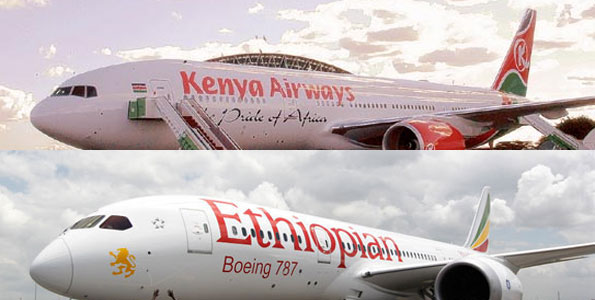Olive Nkirote recently posted a chart comparing Ethiopian Airlines (ET) and Kenya Airways (KQ). Below is a factual analysis of her claims on the ET vs KQ comparison:
1. Ownership
Claim: ET is fully government-owned, while Kenya owns 48.9% of KQ through a public-private partnership.
Verdict: ✅ True.
ET is entirely state-owned.
KQ’s ownership includes:
- Government of Kenya: 48.9%
- KQ Lenders 2017 Ltd: 38.1%
- KLM-Air France: 7.8%
- Minority shareholders: 2.8%
- KQ employees: 2.4%
2. Autonomy and Political Influence
Claim: ET operates commercially; KQ is politically influenced.
Verdict: ❌ False (Partly).
ET is more autonomous, but KQ’s board includes professionals from the private sector. Although the Kenyan government is the largest shareholder, it holds only three board seats. Being a majority shareholder, it can influence board appointments. Management is competitively recruited.
Kenya Airways vs Ethiopian Airlines: How KQ lost glory as ET soared
3. Pandemic Response (Cargo Operations)
Claim: ET used cargo to stay profitable during COVID-19; KQ did not.
Verdict: ❌ False.
ET repurposed passenger planes to support the UN’s humanitarian hub in Addis. KQ also repurposed aircraft, becoming the first airline globally to convert a Boeing 787 for cargo. It now operates four freighter aircraft, with more planned.
4. Bailouts and Political Interference
Claim: ET runs without bailouts; KQ is politically dependent and costly to taxpayers.
Verdict: ❌ False.
ET receives substantial government support through national budget allocations. KQ’s assistance comes in the form of repayable loans from its largest shareholder—the government, not taxpayer-funded bailouts. Its operations remain professionally managed.
5. Profitability and National Contribution
Claim: ET is profitable and contributes to Ethiopia’s economy; KQ is not.
Verdict: ⚠ Partly True.
ET is profitable and valuable to Ethiopia. But this is an apples-and-oranges comparison. ET’s reporting is not for the flying business alone but for the entire group. This includes business units that are not directly related to running the airline, such as hotels and the airport itself. While KQ has struggled financially, it plays a strategic role in Kenya’s economy, supporting industries like floriculture, fresh produce, seafood, coffee, and tea. These sectors employ over 500,000 Kenyans and are major GDP contributors.
6. Vertical Integration
Claim: ET owns and operates multiple aviation services; KQ is just an airline.
Verdict: ⚠ Partly True
ET is in charge of the entire airport
KQ owns:
- The Pride Centre (aviation training, soon to offer degrees with London Metropolitan University)
- Kenya Airways Cargo (helping make JKIA Africa’s top export hub by volume)
- MRO facility (EU-certified, servicing airlines across Africa and Europe)
- Ground handling subsidiary (working with six other firms)
KQ is more than an airline—it is Kenya’s only truly global company, significantly contributing to the economy.
Conclusion
While Ethiopian Airlines has some operational and financial advantages, many of the claims comparing it to Kenya Airways are oversimplified or misleading. KQ faces challenges but also plays a critical and strategic economic role in Kenya. That said, the ET model, where all the country’s aviation assets are consolidated into one profitably run entity, offers useful lessons to KQ. Perhaps it is time to revisit the conversation about having KQ run Kenya’s premier airport, JKIA.








